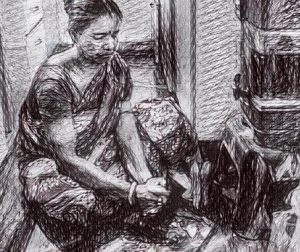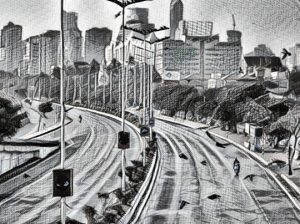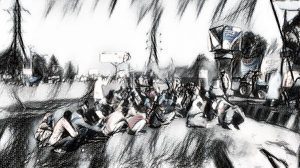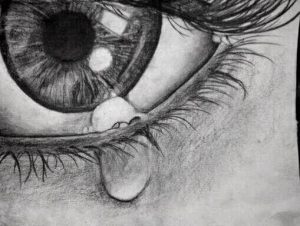Reading Time: 9 minutes
Lure of the city made Gauri’s family migrant labourers in Delhi. The scare of the virus forced them to walk back to their village. What happened to Gauri’s family in the village? Who lost more, the rich or the poor, asks Malvika, in this short story. An exclusive for Different Truths.
My name is Gauri. Me and my family belong to Najibabad in Uttar Pradesh, famous for the ever resounding folklores of Sultana Daku, the messiah of poor. He was notorious for looting the rich and distributing the loot amongst the needy and the poor. Farmers by birth we had sufficient land to manage food and grains for the family but, year after year the raging floods left nothing for us. Each year, we lost our harvest to the furious rivers. Still we managed to endure as the land, always like a mother, cared for us with some produce for our survival. This was sufficient for our stomachs but we were concerned about our son’s future and the ever increasing debts.
Each year, we lost our harvest to the furious rivers. Still we managed to endure as the land, always like a mother, cared for us with some produce for our survival. This was sufficient for our stomachs but we were concerned about our son’s future and the ever increasing debts.
Rekha, our neighbour who worked in Delhi was always boastful of the city. Anxious to secure the future of our only son, I wrangled with the qualm inside and called upon Rekha to help me and my husband find some work in Delhi. Soon she called us to Delhi as she had found some work for me. Delhi was not far. We grabbed and packed whatever was possible and left to catch the first bus to Delhi. All along the way, I could just recall everything Rekha ever told me about Delhi and pictured our future in the Capital city. It just felt like the begining of a new life with hopes of a secure future.
Rekha was kind enough to welcome us at the bus stand. I had never seen so many buses at once in my life. They all looked the same. Delhi appeared to be a country in itself and in this big city Rekha got us a small Jhuggi on rent. It looked too small to live in but cost us almost a fortune. However, that was the best we could afford in the whole cluster.
Rekha got me a job as a house help in the home of Kapoor Sahab. My husband  also started earning as a daily wage labourer. There was no dearth of work for him in Delhi. Though we could not get our son admission in a School but the NGO wali Didi was kind enough to admit him in her classes and provide him books. We hoped to get him admitted in a formal school next year. Till then we started sending money back home to pay off our debts.
also started earning as a daily wage labourer. There was no dearth of work for him in Delhi. Though we could not get our son admission in a School but the NGO wali Didi was kind enough to admit him in her classes and provide him books. We hoped to get him admitted in a formal school next year. Till then we started sending money back home to pay off our debts.
Sahab and Memsahab both worked for some big companies and their only son, recently shifted to America for work. Their entire day was spent outside for work. I did all their household chores. The house was flooded with their son’s pictures and he was the only common subject between Sahab and Memsahab.
Soon Sahab and Memsahab got another common subject to talk about, some virus. I found it strange that even when they would call their son they would only talk about the same virus. They were worried about the virus in India and also in America.
Soon Sahab and Memsahab got another common subject to talk about, some virus. I found it strange that even when they would call their son they would only talk about the same virus. They were worried about the virus in India and also in America. They were concered for their son and asked him to immediately come back to India.
Sahab was relentlessly calling his acquaintances to get his son out of the airport. When their son finally reached home he was also fuming with anger. He was talking of a lot of harassment at the airport.
Within a few days, their son returned to India but was held up for the whole day at the airport for some screening to check if he was infected. Sahab and Memsahab  were enraged and upset. Sahab was relentlessly calling his acquaintances to get his son out of the airport. When their son finally reached home he was also fuming with anger. He was talking of a lot of harassment at the airport. He said he was checked repeatedly at the airport for the virus. They all were extremely annoyed because of the way Govt was handling the situation, but were also elated and relieved that their son was back home away from the virus.
were enraged and upset. Sahab was relentlessly calling his acquaintances to get his son out of the airport. When their son finally reached home he was also fuming with anger. He was talking of a lot of harassment at the airport. He said he was checked repeatedly at the airport for the virus. They all were extremely annoyed because of the way Govt was handling the situation, but were also elated and relieved that their son was back home away from the virus.
The same night,the Prime Minister made an announcement. He said something about closing the country forthe next few days. I did not understand how the country could be closed! How would my husband work? How would he earn his daily living? But I asked my masters and they confirmed that the country was being closed for the next few days. They bought groceries and other essentials to keep them going for the next few months. They also assured me that I could continue working at their home.
The same night, the Prime Minister made an announcement. He said something about closing the country for the next few days. I did not understand how the country could be closed! How would my husband work?
Our bad luck! A house help living in the Jhuggi cluster got infected by the virus and an advisory was issued in the society that every house should ask their maids and drivers not to enter the society. Memsahab asked me not to come for work till things got back to normal. I was in a state of shock. Where could we go in those times? The money we had would have kept us going for the next one week only. What after that! I tried reasoning with memsahib, but in vain. Obviously what she could do. It was an advisory from the society.
The country was closed. There were no means of transport. Finally, we decided to walk back to our village which was almost 200 Kms from Delhi. It was a long and arduous journey but together we thought we could make it.
Having no means to survive, the only option left was going back to our village. The others from the Jhuggi also planned to go back to their villages. In the village atleast we would be able to forage some food and have roof over our heads. But the question arose, how do we go to our village? The country was closed. There were no means of transport. Finally, we decided to walk back to our village which was almost 200 Kms from Delhi. It was a long and arduous journey but together we thought we could make it.
The virus would have killed us tomorrow, but hunger would have killed us in days. We started our long walk home only to face police, lathis, indifference and sleepless walking nights. I could not understand why we were being stopped and beaten for going to our own village. Throughout the way I just recalled Sahab and Memsahab making frantic calls to secure the safe arrival of their son from airport to home. For us there was nobody to be called. Sultana seemed to be only a folklore and no messiah of poor was around.
I felt harassed when we were asked to stand in a queue to be showered with disinfectant liquid in the name of killing the virus. I wearing a saree refused to be showered wet in the public. My husband and son also agitated only to receive some more batons. I stood embarrassed in my wet clothes only to walk past the crowd with lowered eyes
I felt harassed when we were asked to stand in a queue to be showered with  disinfectant liquid in the name of killing the virus. I wearing a saree refused to be showered wet in the public. My husband and son also agitated only to receive some more batons. I stood embarrassed in my wet clothes only to walk past the crowd with lowered eyes wishing to reach home as early as possible.
disinfectant liquid in the name of killing the virus. I wearing a saree refused to be showered wet in the public. My husband and son also agitated only to receive some more batons. I stood embarrassed in my wet clothes only to walk past the crowd with lowered eyes wishing to reach home as early as possible.
Finally, we reached our village. Soon police started coming to the village to find out who all had come back from the cities. We were treated like criminals. We all were infuriated at the treatment meted out to us. Few people in the village were helping police identify each person who came back from the city. Two days after that we got to know that one such informer was lynched in a nearby village. The virus had not taken any life yet in the vicinity, but it was unfortunate that people were getting killed in the name of the virus.
Soon police started coming to the village to find out who all had come back from the cities. We were treated like criminals. We all were infuriated at the treatment meted out to us. Few people in the village were helping police identify each person who came back from the city.
A couple of days later, my son woke up in the morning with fever. He also complained of cough and sore throat. We thought it must be the seasonal flu. I used cold water strips to contain the fever and gave him Tulsi to relieve his sore throat. He slept with difficulty that night.
My son’s condition deteriorated in the coming days. My husband’s brother asked us to take him to the hospital, for he might be suffering from the virus. We took him to the hospital and were informed that he had the virus. The doctor told us that his condition was critical as we took too long to bring him to the hospital.
My son’s condition deteriorated in the coming days. My husband’s brother asked us to take him to the hospital, for he might be suffering from the virus. We took him to the hospital and were informed that he had the virus.
My son was admitted in a special hospital. We were not allowed to visit him or meet him. Our entire family was also tested for the virus and we were told not to step out of our home or to meet anyone from the outside. Villagers were outraged. They outlawed us and asked us to leave the village. We moved out in a shanty on the outskirts of our village.
We both were scared as the virus was chronic and had killed a lot of people. I was not concerned about myself, but my son! We had not heard his voice or seen him for a week. I prayed to God that he gets well soon and we all be a normal family again.
The next day, the health workers informed us that our son was critical. We asked for permission to meet him once, but were denied. During the day, we were informed that our son succumbed to the virus. I was hapless and wanted to see him one last time, but again was not permitted. The doctors and officials did not allow anyone to attend the funeral.
The next day, the health workers informed us that our son was critical. We asked for  permission to meet him once, but were denied. During the day, we were informed that our son succumbed to the virus. I was hapless and wanted to see him one last time, but again was not permitted. The doctors and officials did not allow anyone to attend the funeral. My son’s body was burnt by the health workers. I was devastated, but what could I do against this virus.
permission to meet him once, but were denied. During the day, we were informed that our son succumbed to the virus. I was hapless and wanted to see him one last time, but again was not permitted. The doctors and officials did not allow anyone to attend the funeral. My son’s body was burnt by the health workers. I was devastated, but what could I do against this virus.
After a few weeks, when nobody else in our family got the virus, we were allowed to go out of our house. But nobody met us or condoled us as my son had died of the virus. The grief of losing my only son and the agony of a social boycott left indelible scars on my soul.
We lived our life like outlaws in the village and waited for the virus to go from the country so that we resumed our lives. Finally, after some days the Prime Minister communicated on the news that virus had left our country. We could go back to our routine lives.
We lived our life like outlaws in the village and waited for the virus to go from the country so that we resumed our lives. Finally, after some days the Prime Minister communicated on the news that virus had left our country. We could go back to our routine lives. We were relieved as my brother-in-law also got impatient by our prolonged stay. His family gave us their sympathies for the demise of my only son, but their expressions conveyed us the relief that they had on our return to the city.
We started our journey back. The country had opened again. We took the bus to the city and headed back to our old lives. We reached our master’s home. They were happy to see us and asked me to resume my work. Memsahab was sympathetic towards my loss and grieved with me for a while. She said they too had to suffer a lot. Their only son had lost his job in America. Its not just the poor and downtrodden who had to suffer because of the pandemic. The rich equally fell prey to the virus and had to bear suffering.
Memsahab was sympathetic towards my loss and grieved with me for a while. She said they too had to suffer a lot. Their only son had lost his job in America. Its not just the poor and downtrodden who had to suffer because of the pandemic.
It indeed must be a great loss to the family, as she equates it with the loss of my son. Probably the life of my son equals the loss of her son’s job. That must be the difference in our class. Indeed the scars of loss are also a class apart!
Photo from the Internet
















touching story with vivid deeply engrossing narrative. It bares the fear and tragedy of millions. Homeowners somehow manage it, but where do the roofless stay?